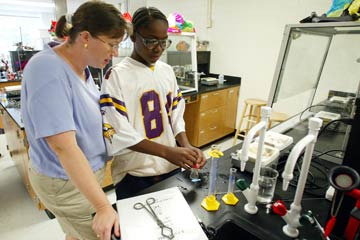Science education for kids: starts early, continues in summer

Angela King (left) of the Wake Forest chemistry department assists arising high school student with a science experiment during the annual SciMax Summer Enrichment Institute at Wake Forest.
Whether your children are just starting grade school or are in the midst of their high school years, it’s important to challenge and develop their science skills, says Angela King, a senior lecturer in the chemistry department at Wake Forest University.
“Younger kids can practice their scientific skills while being outside,” King said. “Collect anything – leaves, rocks, flowers – and look for patterns, similarities and differences.”
She says that observation skills are critical for scientists and there are a number of ways those skills can be put into practice during the summer.
“Have kids observe and count birds at a feeder for just a few minutes each day,” says King, the mother of children in preschool and early elementary school. “Count the number of people in the local pool each day. Does it go up with the temperature?”
Science-related activities can be done while children participate in traditional summer routines, and King says science activities do not have to be expensive.
“My son had a blast making rockets out of empty water bottles, vinegar and baking soda,” King said. “We found the directions at an online educational site and then did the experiment for pennies.
She recommends Web sites maintained by educational and science groups such as Discovery, National Geographic and the Smithsonian.
For high school students, King recommends enrolling them in challenging science and math classes no matter what their career plans may be.
“High school kids don’t have to know their exact career path,” she said. “Enrolling in challenging science and math classes arms them with skills – critical thinking, data analysis – that serve them well no matter what path they choose. Courses with lab or internship components help students experience what career practitioners in that field do each day.”
King says many state parks offer educational programs for all ages that help stimulate an interest in science and nature. Most of the programs are free to the public but may require advanced registration.
For any school-age child, King recommends talking with school administrators and teachers about local opportunities at any time.
“There are programs that run both after school and in the summer, many at no cost to families,” she said. “Finding out what is available will help you make the best choices for your child.”
Science education should be fun says King, who leads the SciMax Summer Enrichment Institute at Wake Forest each summer for rising high school students.
“Excitement provides motivation for mastering skills needed not only to make discoveries that impact the world, but also to function well in our technology-based society,” King said. “The best way to get kids interested in science and math is to have them actively engage in thinking and hands-on manipulations, but that doesn’t rule out fun.”



